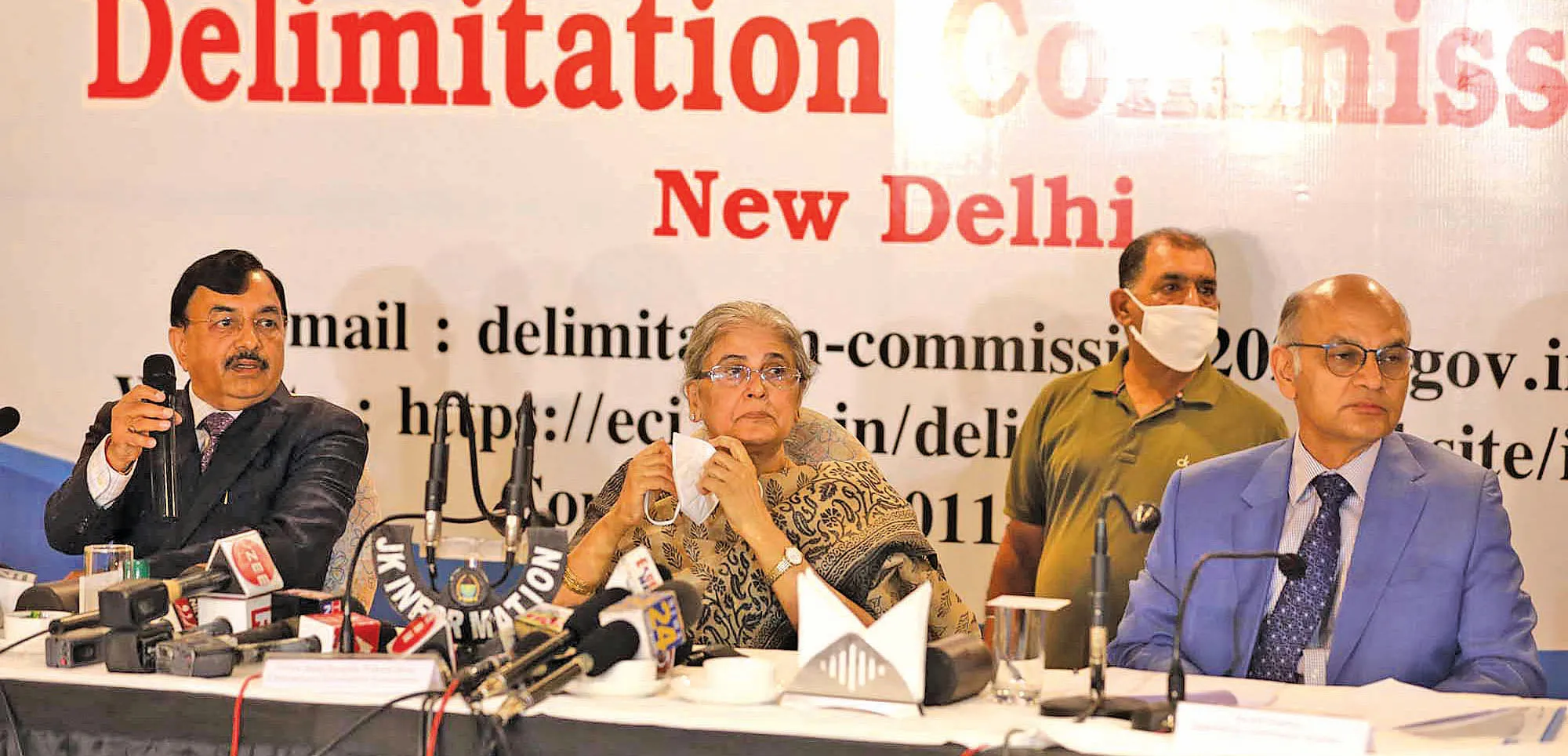The Delimitation Commission Chairperson Justice Ranjana Prakash Desai laid an extra stress on “transparency and fairness” of working of the panel headed by her at the conclusion of four-day visit of Jammu and Kashmir on Friday last . It is a welcome statement but untested. That was clear because the Commission Chairperson herself spoke in future tense.
The beauty of the visit was that the commission listened to all the viewpoints which thrived on the cross-currents, often bordering on brazen hostility toward others. The groups that met the panel were grappling with their own dilemmas and sought the escape route through strident noises, barring a couple of exceptions. The sound and fury makes good theatre but in teal-time politics it is having its own perils.
Those who heard were aware that the repeated calls for the transparency and fairness by these groups had a hidden theme of having a cake and eating it too. They were hostages, or, let me put it other way round, perpetrators of the “us versus they” attitude, contradicting their own rhetoric that they wanted unity and integrity of J&K . Those proclaiming to the be the custodians of communal harmony and regional integration spoke in absolutely contradictory terms in which their real agenda became too obvious to be ignored.
The Commission has a much more formidable task to perform than delineating constituencies and arranging them in order within the boundaries of tehsils and districts to remove the discrepancies that have cropped up since the last delimitation was done in 1995. The debate of population versus area has already exposed the fault lines which dot the territory and its people. The Commission members were prescient enough to understand what was being said to them and with what purpose. So, how the commission will do its work and deliver its verdict will determine that how far it has been able to iron out the differences between the regions and the people. And, it is unfortunate that the whole debate centered around Kashmir versus Jammu, as if the whole thing was all about two different entities that had nothing to do with each other. Against this backdrop , the lament of some of the parties over the loss of special status , statehood based on the three regions , appeared sham . They have harmed the cause which they claim to espouse.
In fact, they have given a legitimacy to the decisions of August 5, 2019 , when 200-year-old state lost its special status, rights and was split into two union territories.
Delimitation Commission is a constitutional body and it has to go by its mandate. But what is the Constitution? It is not just the written document, as is the case in most of the countries – in the UK, however, the conventions form the core of the unwritten constitution. The constitution offers us guarantees that there would be no infringement of our rights. I am not so sure whether it can set a new precedent, may be it is too adventurous for it, but if the scales of justice are to be met, it should not hesitate in exploring the new ideas while allocating the seats.
From July 6 to 9 when the commission was here, it was told two things: that its constitution is unconstitutional and illegal because it was constituted in the aftermath of the abrogation of Article 370 that granted special status to Jammu and Kashmir in the Constitution of India, and the subsequent division of the special status into two union territories. But still it was expected that it would deliver justice in fair and transparent manner. This is an irony, which the theorists have not been able to explain. Their political compulsions arising out of behind-the scene deals, the power-game ambitions and the mounting pressure of the people to move beyond the boycott politics drove them to meet and interact with the commission in Srinagar, Pahalgam , Kishtwar and Jammu.
The Commission’s task is crucially important for the people of J&K, and also for the rest of the country. The timings, circumstances and the fresh regional, sub-regional, religious and ethnic divisions have added a geo-political strategic challenge.
There is no doubt that population is one of the most critically important components of determining the number of constituencies. Then it should apply to all places in equal measure, so should be the case for area as well. More important than that the topography, terrain, remoteness of the places and people should be on the table of cartographers.
The population cannot be separated from the area. Population lives on earth. The earth is measured , where everything is accounted for – forests, riverbeds, rocks and glaciers, deserts. Here, the vision of all-inclusive approach gains greater relevance.
It is a different matter that if some people are determined to have fragmented approach, without understanding the consequences thereof. That will be prone to exploitation by the external forces as also by those having the parochial mindset.
Jammu and Kashmir was once hailed as mini-India because of its diverse geography, terrain, topography, variety of languages and its multilateral demographic structure. It cannot be split further on any lines, and any push for such experiment would have disastrous results.
To see that, let them climb up to a hill top and see what is happening in the bigger region in which we are sitting. Therefore, let me sum it up that for all this the Commission will have to live by each and every letter the phrase “fair and transparent”, to enable J&K to look forward to future of promise.
Disclaimer: The views and opinions expressed in this article are the personal opinions of the author. The facts, analysis, assumptions and perspective appearing in the article do not reflect the views of GK.







